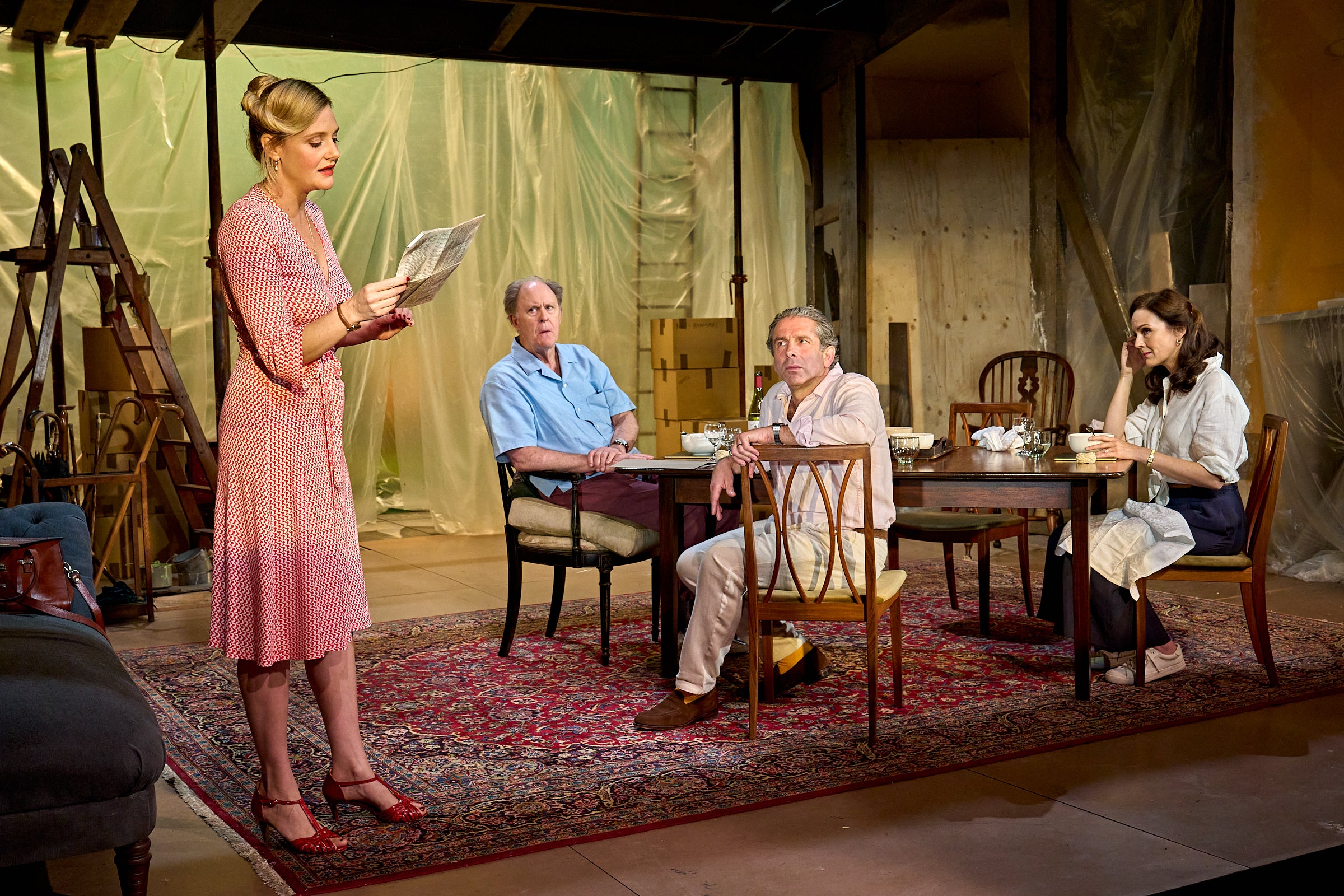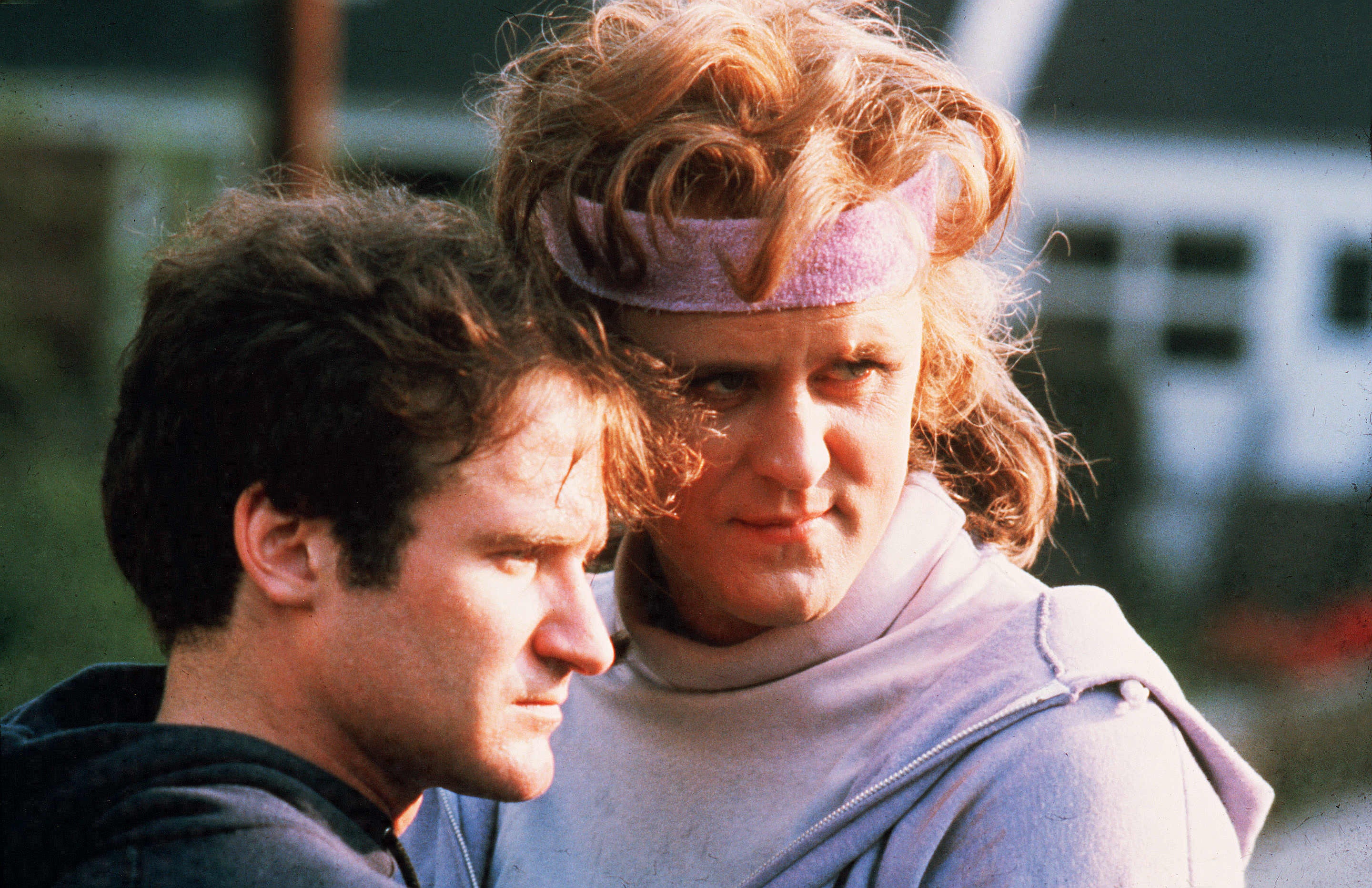If you’re lucky,” says John Lithgow, “an actor gets to speak a few lines in his career that you just absolutely know are going to have a terrific impact. And in this case I’m afraid it’s Roald Dahl. That’s a line that you cannot unhear.”
Lithgow – star of 3rd Rock from the Sun, Winston Churchill in The Crown, the voice of Lord Farquaad in Shrek – is the grandest American actor to be lured to the Royal Court in many years, and he has been showered with rave reviews for his performance in Giant. Mark Rosenblatt’s acclaimed debut play imagines a summer afternoon in 1983 when a UK publisher and a US sales director visit the children’s author at his home in Buckinghamshire. Hoping to protect sales of The Witches, they urge Dahl to disavow his antisemitic remarks made in response to Israel’s invasion of Lebanon the previous year.
Instead, the big unfriendly giant doubles down. In a phone interview with the New Statesman, he expands on his mistrust of Jews. “Even a stinker like Hitler,” he concludes, “didn’t just pick on them for no reason.” In 2020, Dahl’s family would issue a public apology.
Lithgow trills the line as if there’s a song in Dahl’s heart. The voice is a wry folksy baritone, the eyes beady, the smile bright and narrow. What goes through an actor’s head when he becomes the mouthpiece for such poison? “I just have this sense of how it’s impacting people,” Lithgow explains.
It’s been a while since a production at the Court has felt quite so commanding. As directed by Nicholas Hytner, Giant is robustly well made on traditional lines while also compellingly of the moment. Though conceived and drafted long before 7 October 2023, few new plays have been so amplified by news headlines. When I meet Lithgow two hours before curtain up, he and the cast – including Romola Garai, Rachael Stirling and Elliot Levey – are about to perform it for the first time since Israel’s most recent invasion of Lebanon.
“Exactly!” he booms. “Early on just the word Beirut suddenly took on 10 times the meaning that it had a month ago and we’ve only just started playing it 10 days ago. It’s just quickened everybody’s attention.”
Did the situation in the Middle East materially affect the production’s viability at any stage? “I think the play would have been exactly what it has become over this three-year process. I think it is the play that Mark wrote. The impact on the audience has enormously deepened for some very simple reasons. Because of what’s happened in the last year, people are better educated about Israel’s history and the conflict with the Palestinians. October 7 was one appalling event but then there was the devastation in Gaza.” Giant, he explains, “is all about the invasion of Lebanon in 1982 and Dahl’s critique of that a year later. Suddenly everybody knows the immediate history and has learned an awful lot about 40 years ago. It’s just quickened everybody’s attention.”
If the play fits the times, the role fits the actor. Hytner first directed Lithgow on Broadway in 2002 in Marvin Hamlisch’s musical version of Sweet Smell of Success, the cynical noir about newspapers, and 10 years later invited him to the National to star in The Magistrate. Three years ago he sounded Lithgow out about playing Dahl. “The minute Nick said those two words, it went off like a light. And I can’t imagine anybody else playing the part because there’s no one quite like Dahl and there’s no one quite like me and there’s a Venn diagram in which my performance appears.”
The likeness is partly a question of inches. The figure who lopes alertly into the room in a blue tweed cap and thick-rimmed specs is a gangly six foot three. Height-wise Lithgow is as right for Dahl, who was a tottering six foot six, as he was wrong for Churchill. “For 10 Downing Street they had the door much higher than it actually is,” he confides, “because I just dwarfed the door.”
Lithgow is the right fit for deeper reasons, having over a long career commuted between genial do-gooders and cold-hearted killjoys – plus actual killers. In Terms of Endearment, he memorably ticks off a till assistant who denies being rude: “Then you must be from New York.” Compare and contrast with his small-town pastor in Footloose who fulminates against “this obscene rock’n’roll music”. Bonnie Turner, who cast him in 3rd Rock as an alien who has to learn to be human, once told him, “Your face can go anywhere. You don’t know whether it’s going to be scary or funny or moving.”

In Dahl, there’s something of all these colours: pied piper, pulpiteer, bully, bigot. “What fascinates me is what are the origins of that hatred. I think so much of that comes from injury, from damage. He was a charmer and a wit, but he had a vile temper and he could be horrible to people. And he had a deeply emotional side. He endured awful grief when one of his children was badly injured and another passed away.” The result is an immense performance that deftly finds complexity in monstrosity.
I first interviewed Lithgow in 2007 when, at 61, he was playing Malvolio in Stratford. He already seemed a sagacious elder. He turns 79 this month. How is he taking the strain?
“It is true you reach this age and you kid yourself into thinking you’re capable of more than you’re capable of. The rehearsal period was just boot camp. Romola Garai [who plays the fictional Jewish-American sales director Jessie Stone] is half my age and has three times my strength and smarts. It was very much catching up with her, meeting her on her own terms.” He comes off stage feeling “depleted but elated. As dark and tortured as it is, it’s making us all extremely happy. And I’m not there yet. I haven’t given my flawless performance yet.” Indeed he’s apologetically late for our chat because he missed four critical lines the previous night. “I was going over and over and over that passage to make sure I got it right, the way a musician does.”
Getting to be this age with so little competition I’m just being asked to do all these marvellous roles. They just come tumbling at me
John Lithgow
Officially, this is Lithgow’s Royal Court debut. Unofficially, as a Lamda graduate and English theatre nerd on a grant back in the late 1960s, he sort of co-directed the very first production in its new Theatre Upstairs. Mike Stott’s Erogenous Zones was “a very ironic take on all things commercially American”, he told me in 2007. Having often sat in the stalls, he has lately grown aware of a theatre losing its way, not least when embroiled in its own antisemitism controversy about the 2021 play Rare Earth Mettle which featured a grasping billionaire called Hershel Fink.
“I had gotten the impression that the Royal Court was struggling along, waiting for the next Hangmen [Martin McDonagh’s 2015 hit]. Nothing else had made it across the ocean into my field of vision, and I was a little concerned, like, what’s going on with the Royal Court? One of the great things about our opening was this sense of ‘Ah, it’s a great Royal Court play and it’s a great return to form.’ This is no judgement,” he adds diplomatically, “on what happened in recent years.”
As a Broadway regular who won a Tony in 1973 in David Storey’s The Changing Room, first staged at the Court, Lithgow’s hope is that Giant will cross the Atlantic, preferably with all his co-stars. “We have our fingers crossed that it will have another life and breathe a little bit longer. I’d love to get it over to the US. The reception we’ve gotten has been like a mandate to keep performing.”

Steeped in Shakespeare as a child, his father having run Bardic festivals in Ohio, Lithgow always felt an affinity with British theatre. While at Lamda he saw many grandees at Stratford. He coached two of them – Peggy Ashcroft and Michael Hordern – to speak American when Edward Albee’s A Delicate Balance was first produced in London. “But Edward said, ‘Forget the accents.’” In 1989 Albee staged Who’s Afraid of Virginia Woolf in Los Angeles with Lithgow and Glenda Jackson. “Boy, she was a handful. I was frankly kind of scared of Edward Albee, who was not a good director, but a lovely bond grew up between us from the fact that both of us feared Glenda Jackson.”
There is another overlap with Dahl. Lithgow is an author too. He has published three bestselling volumes of satirical verse about Trumpty Dumpty, illustrating them himself. He calls them “an entertainment for liberals, preaching to the choir”. Before that, he wrote nine books for children, which grew out of concerts that he put on when his two children with second wife Mary Yeager were young. “Now I have a wonderful granddaughter I should start again, but I’m getting a little tired.”
Giant interrogates the idea that an author’s work can be taken as separate from their views. Lithgow doesn’t get drawn on this but professes himself appalled at censorious bowdlerisations recently imposed on Dahl’s stories. “The great power of his stuff for kids is that it excites them. And you just can’t play around with it. It’s terrible to take that genius writing away from kids. I’m with Salman Rushdie on the subject.”
This would seem to place Lithgow on one side of the aisle on a key issue in the culture wars. He pops up on the other when I ask him about The World According to Garp. He played Roberta Muldoon, a transgender ex-footballer who drawls, “I had a great pair of hands”. That was 42 years ago. “I don’t think Roberta would be played by a man any more,” he says.

For a forthcoming film called Jimpa, he takes the title role of a gay grandfather who receives a visit in Amsterdam from his daughter, played by Olivia Colman, and her non-binary queer 16-year-old. “The wonderfully witty and transgressive granddad calls her his ‘grand thing’. I laboured over the pronouns the entire time. But then so does Jim – he’s too old to adapt.”
Age is the constant drumbeat of our conversation. For Lithgow, for now, the pros seem firmly to outweigh the cons. “Getting to be this age with so little competition I’m just being asked to do all these marvellous roles. They just come tumbling at me.” A second series of The Old Man with Jeff Bridges is out now, and he’s just shot a film in New Zealand with Geoffrey Rush. Look out for him also in the film of Robert Harris’s Vatican thriller Conclave. There has even been talk of a 3rd Rock reboot.
“We’ve had a couple of wonderful reunions. I’m much more excited about moving on to something I’ve never done. That really was high energy and very, very verbal wacky comedy and I’m just not capable of that any more, at least not at that speed.”
And yet the energy to play Dahl at full force eight times a week is still there? “Oh yeah,” he says. “Something weird happens to you when you’re acting. You just do things that you really are not capable of doing.”
‘Giant’ is at the Royal Court until 16 November; royalcourttheatre.com

